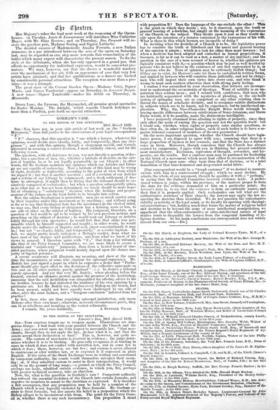GORHAM'S CASE.
TO THE EDITOR OF THE SPECTATOR.
26th _March 1850.
Sea.—You have not, in your able article of last week on the " Gorham
Movement," done full justice to the observations of your legal correspondent ss Fs,
" F." observes, that this question is " one which a lawyer, whatever his opinions, would decide more clearly, fairly, and temperately, than any cler- gyman " ; and with this opinion, though a clergyman myself, and warmly mterested in securing a correct decision, I most cordially concur, and for the following reason. The question, with all deference to you, was not directly a question of doc- trine, but a question of fact, viz., whether a latitude of doctrine on the sub- ject of baptism be or be not legally permissible in our Church ; in other words, did Mr. Gorham maintain any opinions which our Articles and Litur- gy are not capable of embracing. Now a latitude of this Lind may be wrong or right, desirable or deplorable, according to the point of view from which we regard it ; but that is another question ; and if a revision of our Articles and a reform of our Liturgy be commenced, and a fresh settlement of doc- trine be attempted, it might then be fitting that the tribunal should be ex- clusively composed of ecclesiastics : but when a question subsequently arises, as to what has or has not been determined, we surely should be more hope- ful of obtaining a " satisfactory " decision when the feelings and prepos- sessions of the judges are the least liable to be brought into action. Now the odium theologicum is proverbial : men are as much carried away by their impulses under this movement as by anything ; and without going so far as to say that theological hate has the ascendancy in the clerical mind, we may say, that every bishop or clergyman has a leaning, more or less, to one side or other on the subject of baptism. His judgment, therefore, on a question of fact would be apt to be warped by his own previous notions and preaching on the subject of doctrine ; he would read our Liturgy or Articles solely through his own spectacles ; he would feel that that alone was per- missible which he himself supported and taught ; in other words, he would decide under the influence of impulse and zeal, (most conscientiously it may be,) but not "so clearly, fairly, and temperately," as a cooler layman. In fact, we might pretty nearly anticipate a Bishop's verdict, from what we have read of his charges and publications, and from what we know of his views in general. I therefore agree with "F.," that from a lay tribunal, like that of the Privy Council Committee, we are more likely to secure a truthful and "satisfactory " judgment, than from a heated synod of one- sided partisans, whose judgment would mainly depend upon the chance ma- jority of bigoted polemics.
A recent occurrence will illustrate my meaning, and show at the same time the inconsistency of some who clamour for episcopal supremacy. Mr. Badely has just signed a paper in which he expresses a desire that "Parlia- ment should give legal effect to the decisions of the collective episcopate on this and on all other matters purely spiritual" e. he desires a tribunal purely episcopal. And yet this very Mr. Daddy, when pleading before the Council, uttered an offensive protest against the presence of the Archbishop, assuming that the said Archbishop was disqualified for offering advice to Ins lay brother, because he had indicated the tendency of his own opinions by a particular act. Let Mr. Brady say, whether every Bishop on the bench, had he been present, might not have equally been challenged by one side or other, after the same fashion, and a " foregone conclusion" inferred from his practice ?
In fact, those who are thus requiring episcopal jurisdiction, only mean Bishops after their own heart; otherwise, as recent circumstances prove, they can be as rebellious and insulting as the veriest schismatic.
I remain, Sir, yours faithfully, A SUFFOIX


























 Previous page
Previous page